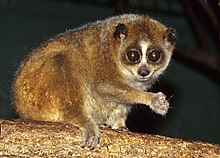Phou Xang He National Protected Area
| Phou Xang He National Protected Area | |
|---|---|
IUCN category VI (protected area with sustainable use of natural resources) | |
| Location | Savannakhet Province, Laos |
| Nearest city | Savannakhet |
| Coordinates | 16°49′1″N 105°44′6″E / 16.81694°N 105.73500°E |
| Area | 1,060 km2 (410 sq mi) (decreed), 1,180 km2 (460 sq mi) (current estimate)[1] |
| Designated | 29 October 1993 |
Phou Xang He National Protected Area is a national protected area in Savannakhet Province in central Laos. This mostly pristine forested park is home to a large variety of important animal and bird species.[1] The park is home to the Phu Tai and Katang ethnic groups and is an ecotourism destination.[1][2]
Geography
Phou Xang He National Protected Area is located about 100 kilometres (60 mi) east of Savannakhet, near the village of Phalan and covers parts of Assaphone, Thaphalanxay, Phin, Xepon and Viraboury districts. The park's area has been estimated at 1,180 square kilometres (460 sq mi).[1]
Flora and fauna
The park's main forest types are evergreen, mixed deciduous and dry dipterocarp forests. Mixed deciduous forest has the largest coverage at 44% of the park's area.[1]

Threatened animal species in the park include elephant, tiger, leopard, clouded leopard, black crested gibbon, François' langur, giant muntjac, gaur, pygmy slow loris, dhole, Asian black bear, sun bear, banteng and large-spotted civet. Phou Xang He's large area and relatively pristine state make the park important in conserving these species in an undisturbed habitat. Other park species include macaque and douc langur.[1]

Bird life includes the threatened red-collared woodpecker. Other less vulnerable species include ratchet-tailed treepie and mountain fulvetta.[1]
Threats
Phou Xang He faces a number of environmental threats. Local poverty has resulted in hunting and forest product harvesting in the park. Some habitat loss has resulted from expansion of lands for agriculture. Road development and improvement may increase opportunities for illegal trade in wildlife and forest products.[1]
See also
References
- ^ a b c d e f g h "Phou Xang He NBCA". Greater Mekong Subregion Sustainable Tourism Development Project in Lao PDR. Archived from the original on 2 April 2015. Retrieved 16 March 2015.
- ^ Ray, Nick; Bloom, Greg; Waters, Richard (February 2014). Lonely Planet Laos (8th ed.). Lonely Planet. p. 209. ISBN 978-1-7432-1825-9.

